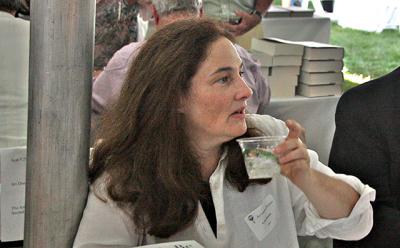A.M. Homes: Never Too Young for an Achievement Award

“The Safety of Objects,” A.M. Homes’s 1990 story collection, arrived like an open-handed smack to the bourgeois reader’s face.
Glasses retrieved, we could see it was beyond fresh, beyond “the way we live now,” or then, as it were; it was subversive (a kidnapped kid’s so annoying the kidnapper returns him), even transgressive (sex with a Barbie doll and then the more fulfilling Ken), all perhaps culturally epitomized by the professional Westchester County couple who take up crack while their children are away. It was her first collection. An announcement of a new voice in American letters.
It is also of critical importance because it happens to be the one book of hers to have been read by her interlocutor in a half-hour phone call one gray Thursday in February, a chat occasioned by Ms. Homes’s selection for a lifetime achievement award in the literary arts from the Guild Hall Academy of the Arts. The ceremony is set for Tuesday night from 6 to 10 in the Rainbow Room in Manhattan, where her fellow honorees will be Sarah Jessica Parker in performing arts, Mary Heilmann in visual arts, and Charlotte Moss and Barry S. Friedberg for leadership and philanthropic endeavors.
“Eric said to me it’s long overdue,” she said of Eric Fischl, the artist and academy president, who will be doing some of the presenting that evening. “And I said, ‘No, it’s not.’ I feel way too young for that kind of thing.” She’s 54, her demurral upon being asked giving way to a verbal shrug of the shoulders in the face of the ubiquitous Google search. “Anyway, these age rules don’t apply anymore. Except maybe to your knees.”
Adding to the overdue feeling may be the fact that she’s been writing in the public eye since she was a college student and came out with a play controversially involving the work of J.D. Salinger, prompting a cease-and-desist order. She went on to turn out a half-dozen novels, most recently “May We Be Forgiven” (a Big American Novel she’d recommend to the uninitiated), two short-story collections, and a memoir, before returning to Salinger with a book of essays to be titled “These Are My Fathers,” which looks as well at other writers important to her: Edward Albee, Joseph Heller, and especially John Cheever.
The Montauk and East Hampton lives of Albee and Heller bring up something else about “The Safety of Objects”: It was written in Amagansett. Ms. Homes has been coming out this way since the mid-’80s, owns what she called “a tiny house” here, and particularly enjoys holing up, in a writerly way, in the local libraries from Montauk west, with their nooks, crannies, and carrels. The former Rogers Memorial on Job’s Lane in Southampton was a favorite: “Lots of big old wood desks surrounded by books — what’s better than that?”
A sanctuary. The entire South Fork can serve as such. As a city dweller, Ms. Homes was an outside-her-window witness to the defining event of the new century, the attacks of 9/11, which left her feeling as though “the terra firma you took for granted you could no longer take for granted. . . . Now there’s a ratcheting up of a sense that the world is not safe. On the East End, comparatively speaking, it is safe. It’s hard to go out to Louse Point and think the world is coming to an end.”
“I see the Guild Hall award as an essential piece of a place and a time that I value enormously.”
“As a kid,” she continued, “I was not a good kid. But I’ve become this overly enthusiastic do-gooder. It’s like I go out looking for old ladies to help across the street. It’s annoying, I’d imagine.”
She teaches at Princeton and, far from complaining about undergraduates, is energized by all the students “who are the first person in their family to go to college.” Generally, “I try to encourage a kind of creativity and intellectual risk-taking that they’re averse to. They’re more test-takers — they’re smart, but they haven’t lived much yet.”
Of her own education, she said, “I feel like I’ve been very lucky. I’ve had wonderful mentors who helped me when I needed it.”
That could be part of an acceptance speech, but she wasn’t quite sure of Tuesday night’s format, or if she’d be speaking at all. “Maybe I’ll read a Frank O’Hara poem.”
